Anne Kennedy


Anne Kennedy’s recent books are The Sea Walks into a Wall, The Ice Shelf, and, as editor, Remember Me: Poems to Learn by Heart from Aotearoa New Zealand. Awards and fellowships include the Prime Minister’s Award for Literary Achievement in Poetry, the NZ Post Book Award for Poetry, and the IIML Writers Residency. Anne is the current editor of AUP’s New Poets series. She lives in Tāmaki Makaurau.
Anne was Guest Poet in takakē 110, and spoke with Anna Scaife about her poems, what she’s reading, and her advice to writers starting out.
The education depicted in “My Education from 1964 to I Forget” is a difficult one, full of lessons about suffering, injustice and fear—which seems very on-topic at present. The world is unfair and callous! Do you think your new work is tapping into an increasing recognition of that fact?
There’s been a strange trajectory about freedom over my lifetime—freedom of being. When I was a kid, it was common not to be allowed to express your feelings. In recent years, young people have demanded the right to talk, to be themselves, to be different and to express all of that. In some ways, although the world is in a terrible state, things are better in that regard. It’s more acceptable to speak about your own experience. I think I’ve been influenced by that. These poems—which I’m aware exist in a world much more troubled than I could imagine—are very personal, and I finally feel the freedom to say them, and to say them in quite a direct way. I want to add, the idea of freedom has been commandeered in an ugly way by anarchists, so the word itself has become problematic. But I don’t know what else to call it at this point. We need a new word for freedom.
What were the first poetry books that mattered to you?
As a young teen, I read my brother Philip’s books. I was a captive audience. I’ve written about this in Moth Hour. He was a young man, and he read Sam Hunt, James K. Baxter, Alan Ginsberg, Gunter Grass, Gertrude Stein—all guys, apart from Gertrude. They hugely influenced me, in different directions. Not just as a writer, of course, as a reader. I think I got quite a span of local lyric poetry—which was important, on the ground like a reporter—and wild freedom. I’m grateful because I don’t think I would have found any of this on my own.
What are you reading at the moment? Or, what was the last book you read that you really loved?
A few months ago, I listened to J.M. Coetzee’s Scenes from a Provincial Childhood. I’d read this three-volume work before, but listening to a South African accent was a different experience which I really loved. I think as a Pākehā, I relate to Coetzee’s awareness of himself in this troubled political situation, but it also being home, and there being no other. It’s so detailed and painful and real. I’ve found few settler writers who will even go there, but it’s how I feel.
Do you have any advice for new writers starting out on their writing journey?
The most important thing is to read, read, read. You’re not on your own. There are other writers out there, who are also readers of writers, who were readers…